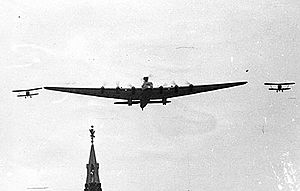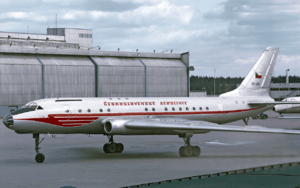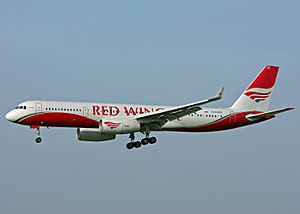Tupolev facts for kids
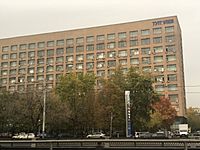
Tupolev Headquarters at the shore of the Yauza river in Moscow
|
|
|
Native name
|
Конструкторское бюро «Туполев»
|
|---|---|
| Division | |
| Industry |
|
| Fate | merged into United Aircraft Corporation |
| Founded | 22 October 1922 |
| Founder | Andrei Tupolev |
| Headquarters |
Academician Tupolev Embankment 17, Basmanny District, Central Administrative Okrug, Moscow
,
Russia
|
|
Key people
|
Ronis Sharipov, director general |
| Products |
|
| Revenue | $437 million (2017) |
|
Operating income
|
$37.4 million (2017) |
| −$1.78 million (2017) | |
| Total assets | $3.01 billion (2017) |
| Total equity | $1.36 billion (2017) |
|
Number of employees
|
3524 (2011) |
| Parent | United Aircraft Corporation |
Tupolev (Russian: Туполев, IPA: [ˈtupəlʲɪf]) is a famous Russian company that designs and builds airplanes. Its main office is in Basmanny District, Moscow.
Tupolev was started in 1922 by a brilliant engineer named Andrei Tupolev. He led the company for 50 years! Since then, Tupolev has designed over 100 different types of planes. They have built more than 18,000 aircraft for Russia and other countries. These planes include both civilian airliners and military aircraft. Tupolev also works on missile and naval aviation technologies. The company celebrated its 100th birthday on October 22, 2022.
In 2006, Tupolev joined a larger group called the United Aircraft Corporation. This happened by a decision from the Russian President Vladimir Putin. Other well-known aircraft companies like Mikoyan and Sukhoi also joined this group.
Contents
History of Tupolev Aircraft
Early Years in the USSR
The Tupolev design bureau was founded by Andrei Tupolev in 1922. This company focused on researching and designing aircraft. Other factories would then build the planes. In the 1920s, Tupolev explored making airplanes entirely out of metal. They were inspired by the work of Hugo Junkers during World War I.
Some of Tupolev's first important planes were large, all-metal bombers. These included the ANT-4, which first flew in 1925, and the four-engine ANT-6 from 1932. These designs helped shape how large aircraft, both civilian and military, would be built for many years.
During World War II, the Tu-2 was a very good twin-engine bomber for the Soviets. Many versions of it were made starting in 1942. Because metal was scarce during the war, some parts of the Tu-2 were made from wood.
Jet Age and Cold War
After the war, Tupolev developed the jet-powered Tu-16 bomber. This plane had swept-back wings, which helped it fly well at high speeds, just below the speed of sound.
Since early jet engines used a lot of fuel, the Soviets needed a bomber that could fly across continents. So, they designed the Tu-95, also known as the Tu-20. This plane used four huge Kuznetsov NK-12 turboprop engines. These engines gave it a unique mix of jet-like speed and very long range. The Tu-95 became the main long-range bomber for the Soviet Union. It was similar to the American Boeing B-52 Stratofortress. It was used for bombing, reconnaissance (spying), and fighting submarines.
The Tu-16 bomber was later turned into a civilian plane, the Tu-104. This was the first Soviet jet airliner. The Tu-95 also became the basis for the Tu-114 airliner, which was the fastest turboprop plane ever built. Many large Tupolev jet planes have a special design feature: large pods under their wings that hold the landing gear. These pods allow the planes to have many large, low-pressure tires. This was very useful for landing on the rough runways that were common in the Soviet Union. For example, the Tu-154 airliner has 14 tires, the same number as the much larger Boeing 777-200.
Even before the Tu-16 and Tu-95 flew, Tupolev was already working on supersonic bombers. This led to the Tu-22 bomber in the mid-1960s. It was meant to be like the American Convair B-58 Hustler. The Tu-22 stayed in service much longer than the American plane. Tupolev also designed unmanned aircraft, like the Tu-139 and Tu-143 spy drones.
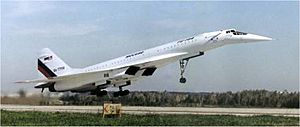
In the 1960s, Andrei Tupolev's son, A. A. Tupolev, started helping to manage the company. He played a big part in developing the world's first supersonic airliner, the Tu-144. He also helped create the popular Tu-154 airliner and the Tupolev Tu-22M strategic bomber. These planes helped the Soviet Union keep up with Western countries in military and civilian aviation.
However, the Tu-144 had some problems. It crashed in 1973 and again in 1978. Because of these accidents, it was stopped from carrying passengers in 1978.
In the 1970s, Tupolev worked on making the Tu-22M bombers even better. Some versions were made for naval use. The large number of these bombers led to important agreements between the US and the Soviet Union to limit weapons. The Tu-154 airliner was also improved, leading to the more efficient Tu-154M.
In the 1980s, the company developed the supersonic Tu-160 strategic bomber. This impressive plane has wings that can change their shape during flight.
After the Soviet Union
After the Cold War ended, Tupolev focused on designing civilian aircraft that fly slower than sound. They worked on making planes more fuel-efficient and able to use new types of fuel. They also developed new technologies like "fly-by-wire" systems. This led to modern transport aircraft like the Tu-204/Tu-214 and the Tu-334.
Some of Tupolev's projects from the 1990s and 2000s included:
- Improving the Tu-204/214 and Tu-334 airplane families.
- Developing cargo planes like the Tu-330 and smaller regional planes like the Tu-324.
- Studying how to use alternative fuels in aircraft.
- Updating planes for the Russian Navy and Air Force.
At the MAKS-2003 in 2003, Tupolev showed a design for a supersonic business jet called the Tu-444. However, this project did not move forward.
In 2023, the United Aircraft Corporation announced that Tupolev would build 20 Tu-214 planes each year. They also plan to develop a cargo version of the Tu-214 to meet Russia's needs.
Key People at Tupolev
- Andrei Nikolayevich Tupolev: He was the main designer at the Central Aero-Hydrodynamic Institute (TsAGI) from 1929 until he passed away in 1972. His design bureau mostly created bombers and airliners.
- Alexei Andreyevich Tupolev: Andrei Tupolev's son, he was also a famous aircraft designer. He designed the supersonic airliner Tupolev Tu-144. He managed Tupolev until his death in 2001.
- Igor Sergeevich Shevchuk: He became the Director of Tupolev in 1997 and later the President and General Designer. He passed away in 2011.
- Alexandr Vladimirovich Koniukhov: He was a director general from 2016 to 2020.
- Ronis Nakipovich Sharipov: He became a director general in May 2020.
- Vadim Vladimirovich Korolev: He has been a managing director since 2021.
In September 2021, Rustam Minnikhanov, the President of Tatarstan, was chosen to lead the board of directors for Tupolev.
Awards and Recognition
The people working at Tupolev have received many important awards and honors:
- 1927: Awarded the Order of the Red Banner of Labour twice for their excellent work in aircraft design and production.
- 1933: Received the Order of the Red Banner for their amazing technical achievements and for creating new types of metal aircraft that helped strengthen the USSR's defense.
- 1947: Given the Order of Lenin for their outstanding work in developing aviation over 25 years.
- 1971: Awarded the Order of the October Revolution for successfully completing their five-year plan and making new equipment.
- 1972: Received another Order of Lenin for their great achievements in creating aviation technology and training aircraft designers.
In 2007, 2012, and 2018, the staff of Tupolev received special thanks from the President of Russia. These awards were for their big contributions to the aviation industry and their success in their work.
Images for kids
See also
 In Spanish: Túpolev para niños
In Spanish: Túpolev para niños
 | Aurelia Browder |
 | Nannie Helen Burroughs |
 | Michelle Alexander |


